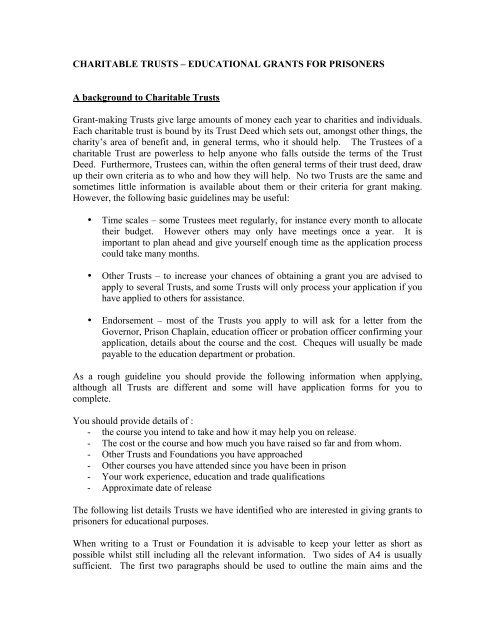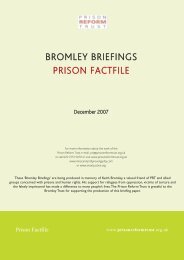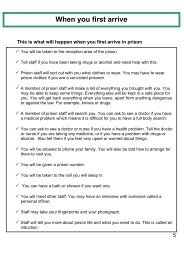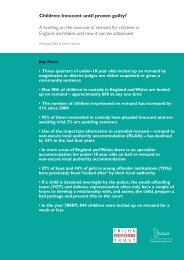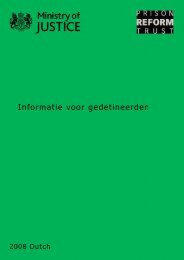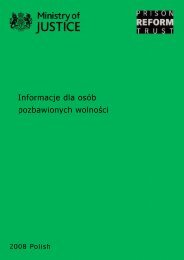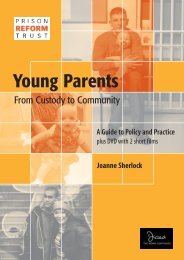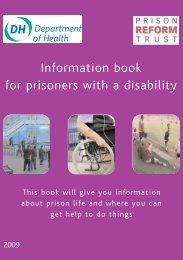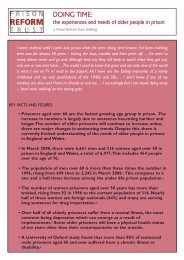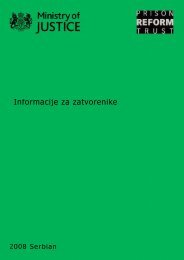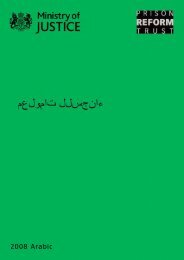here - Prison Reform Trust
here - Prison Reform Trust
here - Prison Reform Trust
You also want an ePaper? Increase the reach of your titles
YUMPU automatically turns print PDFs into web optimized ePapers that Google loves.
CHARITABLE TRUSTS – EDUCATIONAL GRANTS FOR PRISONERS<br />
A background to Charitable <strong>Trust</strong>s<br />
Grant-making <strong>Trust</strong>s give large amounts of money each year to charities and individuals.<br />
Each charitable trust is bound by its <strong>Trust</strong> Deed which sets out, amongst other things, the<br />
charity’s area of benefit and, in general terms, who it should help. The <strong>Trust</strong>ees of a<br />
charitable <strong>Trust</strong> are powerless to help anyone who falls outside the terms of the <strong>Trust</strong><br />
Deed. Furthermore, <strong>Trust</strong>ees can, within the often general terms of their trust deed, draw<br />
up their own criteria as to who and how they will help. No two <strong>Trust</strong>s are the same and<br />
sometimes little information is available about them or their criteria for grant making.<br />
However, the following basic guidelines may be useful:<br />
• Time scales – some <strong>Trust</strong>ees meet regularly, for instance every month to allocate<br />
their budget. However others may only have meetings once a year. It is<br />
important to plan ahead and give yourself enough time as the application process<br />
could take many months.<br />
• Other <strong>Trust</strong>s – to increase your chances of obtaining a grant you are advised to<br />
apply to several <strong>Trust</strong>s, and some <strong>Trust</strong>s will only process your application if you<br />
have applied to others for assistance.<br />
• Endorsement – most of the <strong>Trust</strong>s you apply to will ask for a letter from the<br />
Governor, <strong>Prison</strong> Chaplain, education officer or probation officer confirming your<br />
application, details about the course and the cost. Cheques will usually be made<br />
payable to the education department or probation.<br />
As a rough guideline you should provide the following information when applying,<br />
although all <strong>Trust</strong>s are different and some will have application forms for you to<br />
complete.<br />
You should provide details of :<br />
- the course you intend to take and how it may help you on release.<br />
- The cost or the course and how much you have raised so far and from whom.<br />
- Other <strong>Trust</strong>s and Foundations you have approached<br />
- Other courses you have attended since you have been in prison<br />
- Your work experience, education and trade qualifications<br />
- Approximate date of release<br />
The following list details <strong>Trust</strong>s we have identified who are interested in giving grants to<br />
prisoners for educational purposes.<br />
When writing to a <strong>Trust</strong> or Foundation it is advisable to keep your letter as short as<br />
possible whilst still including all the relevant information. Two sides of A4 is usually<br />
sufficient. The first two paragraphs should be used to outline the main aims and the
purpose of your application. As you will see most <strong>Trust</strong>s listed below have a contact<br />
name. It is advisable to address all correspondence to this particular person rather than<br />
writing “Dear Sir/Madam”. This will impress upon the <strong>Trust</strong> that you have done some<br />
‘homework’ about the organization. One further point, which may be important to note,<br />
is that many <strong>Trust</strong>s prefer the direct approach, i.e. do not be afraid of asking for a specific<br />
(but realistic) sum of money.<br />
THE ALDO TRUST<br />
The Aldo <strong>Trust</strong> makes small grants, usually up to £10 to serving prisoners for things such<br />
as cell hobbies, books and education as well as for toiletries and temporary release.<br />
Annie Smith<br />
The Aldo <strong>Trust</strong><br />
c/o NACRO<br />
169 Clapham Road<br />
London<br />
SW9 0PU<br />
NANCY BALFOUR TRUST<br />
Grants seldom exceed £1-200 and they are usually given for materials or to cover fares to<br />
training centres. The <strong>Trust</strong> is particularly sympathetic to requests that will further<br />
training in fine arts or crafts. Applications should be by post and a stamped addressed<br />
envelope is required should you want acknowledgement.<br />
S.G. Kemp<br />
Messsrs Sayers Butterworth<br />
The Nancy Balfour <strong>Trust</strong><br />
18 Bentinck Street<br />
London<br />
W1M 5RL<br />
BURNBAKE TRUST<br />
The Burnbake <strong>Trust</strong> holds 12-15 exhibitions a year of artwork from prisons with the<br />
artists receiving up to 80% of any sale price, less framing costs. <strong>Prison</strong>ers wishing to<br />
submit their work under this scheme should contact the address below. The <strong>Trust</strong> may<br />
also be able to provide a small package of art material to new artists, funds allowing.<br />
The <strong>Trust</strong> now loans instruments to prison education departments.<br />
The Burnbake <strong>Trust</strong><br />
P.O Box 1839<br />
Bournemouth<br />
BH9 2ZQ
SIR JOHN CASS’S FOUNDATION<br />
The Foundation states that to qualify for consideration applicants must be:<br />
-in genuine financial need<br />
-under 25 years of age<br />
- live within (or come from) the area covered by the London Boroughs of:<br />
Camden<br />
City of London<br />
Greenwich<br />
Hackney<br />
Hammersmith and Fulham<br />
Islington<br />
Kensington and Chelsea<br />
Lambeth<br />
Lewisham<br />
Newham<br />
Southwark<br />
Tower Hamlets<br />
Wandsworth<br />
Westminster<br />
- have lived in this area for at least three years for purposes other than study.<br />
A guidance sheet is available from the <strong>Trust</strong> about their criteria for making grants and<br />
how to apply. When writing you need to concisely set out your needs or proposals. The<br />
<strong>Trust</strong> decides who to give a grant to at quarterly intervals.<br />
Michael Sparks<br />
Sir John Cass’s Foundation<br />
The Clerk to the Governors<br />
31 Jewry Street<br />
London<br />
EC3N 2EY<br />
THE FAMILY WELFARE ASSOCIATION<br />
They provide support for prisoners’ education.<br />
The Family Welfare Association<br />
501-505 Kingsland Road<br />
London<br />
E8 4AU
PRISONERS’ EDUCATION TRUST<br />
Grants are available in selected prisons for men and women so long as:<br />
1. their application is supported by the prison’s education department<br />
2. they have a reasonable chance of completing the course before they complete<br />
their sentence.<br />
The <strong>Trust</strong> works closely with prison education departments and only accepts applications<br />
that have their support. <strong>Prison</strong>s are required to contribute 10% to the total cost of every<br />
course for which the <strong>Trust</strong> makes a grant.<br />
The prisoner completes a simple application form and writes a short letter giving reasons<br />
for wanting to take a particular course. The application form is endorsed by the<br />
education department and sent to the <strong>Trust</strong>.<br />
<strong>Trust</strong>ees meet monthly to consider applications. The results are usually sent to the prison<br />
within 10 days of that meeting. The <strong>Trust</strong> orders the courses and invoices prisons for<br />
their contribution on a quarterly basis.<br />
<strong>Prison</strong>ers may apply for vocational and academic courses and for art materials.<br />
It is best to check whether the prison is in the scheme before applying.<br />
The <strong>Trust</strong> works with the following prisons:<br />
(f) denotes Women’s <strong>Prison</strong><br />
1. Acklington<br />
2. Albany<br />
3. Ashwell<br />
4. Askham Grange(f)<br />
5. Belmarsh<br />
6. Birmingham<br />
7. Blakenhurst<br />
8. Blantrye House<br />
9. Blundeston<br />
10. Bristol<br />
11. Brixton<br />
12. Brockhill (f)<br />
13. Buckley Hall<br />
14. Bullingdon<br />
15. Bullwood Hall<br />
31. Foston Hall (f)<br />
32. Frankland<br />
33. Full Sutton<br />
34. Garth<br />
35. Gartree<br />
36. Grendon<br />
37. Guys Marsh<br />
38. Haverigg<br />
39. Highdown<br />
40. Holloway (f)<br />
41. Kingston<br />
42. Kirklevington<br />
Grange<br />
43. Latchmere House<br />
44. Leeds<br />
61. Pentonville<br />
62. Prescoed<br />
63. Preston<br />
64. Ranby<br />
65. Risley<br />
66. Rochester<br />
67. Rye Hill<br />
68. Send (f)<br />
69. Shepton Mallet<br />
70. Spring Hill<br />
71. Stafford<br />
72. Stocken<br />
73. Styal (f)<br />
74. Sudbury<br />
75. Swaleside
16. Cardiff<br />
17. Channings Wood<br />
18. Cookham Wood (f)<br />
19. Coldingley<br />
20. Dartmoor<br />
21. Downview (f)<br />
22. Drake Hall (f)<br />
23. Durham<br />
24. East Sutton Park (f)<br />
25. Eastwood Park (f)<br />
26. Elmley<br />
27. Erlestoke<br />
28. Featherstone<br />
29. Feltham<br />
30. Ford<br />
45. Leicester<br />
46. Lewes<br />
47. Leyhill<br />
48. Litttlehey<br />
49. Liverpool<br />
50. Long Lartin<br />
51. Low Newton<br />
52. Lowdham Grange<br />
53. Maidstone<br />
54. Manchester<br />
55. Moorland<br />
56. The Mount<br />
57. Norwich<br />
58. Nottingham<br />
59. Parc<br />
60. Parkhurst<br />
76. Usk<br />
77. The Verne<br />
78. Wakefield<br />
79. Wandsworth<br />
80. Wayland<br />
81. Wealstun<br />
82. Wellingborough<br />
83. Whatton<br />
84. Whitemoor<br />
85. Wormwood Scrubs<br />
86. Wymott<br />
<strong>Prison</strong>ers’ Education <strong>Trust</strong><br />
Ground Floor<br />
Wandle House<br />
Riverside Drive<br />
Mitcham<br />
Surrey<br />
CR4 4SU<br />
ROYAL LONDON AID SOCIETY<br />
The objects of the Society are as follows:<br />
“The prevention of crime and delinquency by assisting persons of any age who have<br />
fallen or are at risk of falling into crime to develop their physical, mental and spiritual<br />
capacities and grow to full maturity as individuals and members of society and to<br />
improve their conditions of life.<br />
The after care of all such persons and their families and dependants who are referred as<br />
‘eligible persons’. ‘Aftercare’ in this and all references is to be interpreted as the relief of<br />
poverty, the relief of sickness and the advancement of education and training.
To carry out, further and promote study and research into all aspects of criminology and<br />
the methods of prevention of crime and delinquency and to publish the useful results of<br />
all such study and research.”<br />
Consideration to applications will be given each quarter, i.e. March, June, September,<br />
December.<br />
All applications for grants to individuals of £400 or more, must be supported by an<br />
undertaking that, if the application is successful, a follow-up report will be submitted to<br />
the Society within six months of the award.<br />
The Correspondent<br />
Royal London Aid Society<br />
84 Upney Lane<br />
Barking<br />
Essex<br />
IG11 9LR<br />
JILL FRANKLIN TRUST<br />
This <strong>Trust</strong> needs to know the following before they can consider your application:<br />
1. Can you tell me what other organizations you have approached for money, and<br />
how they have responded (Please list them all)<br />
2. Can you tell me what other courses you have attended since you have been in<br />
prison, and what the results have been<br />
3. What is your work experience, and what educational and trade qualifications do<br />
you have<br />
4. To what career will this course lead, and to what nationally recognized<br />
qualification does it lead<br />
5. What experience do you have in this field<br />
6. What are your plans for resettlement after your release, and how does this course<br />
fit in with them<br />
7. What organization is putting on the course (Name, address, phone number)<br />
8. When does the course start<br />
9. Can you give me details of the books you need (author, title, publisher, ISBN)<br />
We only reckon to provide set, not recommended texts. If the books are provided<br />
it will be on the basis that they are the property of the <strong>Prison</strong> education<br />
department, and may be used by other prisoners doing a similar course.<br />
10. What is your expected release date<br />
11. How much money can you contribute We would expect some contribution from<br />
your prison pay.<br />
12. How much can the prison contribute We would expect them to contribute at<br />
least 10% of the cost.
13. We require an endorsement our your request from your Personal Officer and the<br />
Education Officer.<br />
This trust does not make grants of more than £200 per application (one application per<br />
year), and so you will have to get a promise of additional funding from other trusts before<br />
we can pay any grant that we might make. We only give grants for courses of some<br />
months’ duration.<br />
We do not make grants for education or training for prisoners after release.<br />
Other trust who may be able to help:<br />
HARDMAN TRUST (for those doing more than 10 years)<br />
PO Box 24<br />
Ryde<br />
Isle of Wight<br />
PO33 2YP<br />
SALVATION ARMY<br />
101 Newington Causeway<br />
London<br />
WE1 6BN<br />
SWAN MOUNTAIN TRUST<br />
7 Mount Vernon<br />
London<br />
NW3 6QS<br />
PAUL STEPHENSON MEMORIAL TRUST<br />
C/o Mason Collins Solicitors<br />
8/10 Cricket Green<br />
Mitcham<br />
Surrey<br />
CR4 4LA<br />
WOMEN IN PRISON
WIP run an Educational Training Connection programme, visiting all the women’s<br />
prisons except HMP Downview and HMP Buckley Hall. They offer advice and funding<br />
for educational courses and continue support after release.<br />
3b Aberdeen Studios<br />
22 Highbury Grove<br />
London<br />
N5 2EA<br />
THE PRINCES TRUST<br />
The Princes <strong>Trust</strong> will only help those prisoners aged 25 and under. They will fund short<br />
courses i.e. 1-2 months rather that longer courses. Write directly to your local committee<br />
whose address can be found under “The Prince’s <strong>Trust</strong>” in your local telephone directory.<br />
Alternatively, you can obtain a list of the local groups from the Head Office at the<br />
address below. A representative of the local committee will contact/visit you to discuss<br />
your application.<br />
Graham Watson<br />
Director of Finances & Support Services<br />
The Princes <strong>Trust</strong><br />
8 Bedford Row<br />
London<br />
WC1R 4BA<br />
EDUCATIONAL GRANTS ADVISORY SERVICE<br />
This service provides advice and guidance on sources of funding for education but they<br />
do not make grants themselves.<br />
Ayo Grillo<br />
501-505 Kingsland Road<br />
Dalston<br />
London<br />
E8 4AU<br />
BUCKINGHAMSHIRE ASSOCIATION FOR THE CARE OF OFFENDERS<br />
This organization provides grants of up to £100 for individuals to support resettlement,<br />
education and ‘back to work’ plans. Any application that is made must be supported by a<br />
professional.<br />
Roger Russell<br />
28 North End Road<br />
Steeple Clayton<br />
Bucks
MK18 2PG<br />
FRANK LONGFORD CHARITABLE TRUST<br />
This provides financial support to ex-prisoners who are in further and higher education. A<br />
very limited number of scholarships are given each year.<br />
Peter Stanford<br />
42 Callcott Road<br />
London<br />
NW6 7EA


